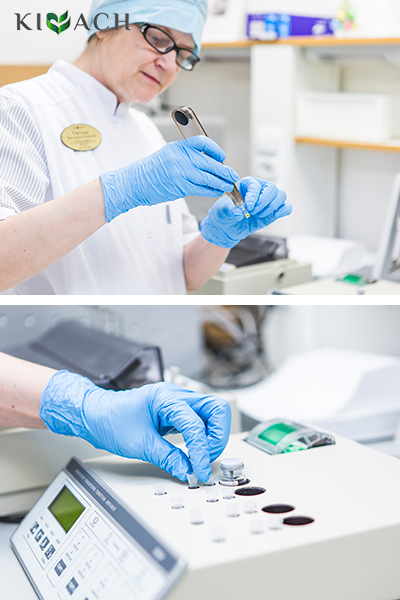What is laboratory diagnosis?
Methods aimed at the analysis of biological material (blood, urine, sputum, semen, hair, etc.) with the help of various special equipment. Such analysis helps to identify or confirm the presence of a pathology which cannot be identified by an organoleptic method (i.e., with the help of vision, haptic, olfaction, etc.). Up to 80% of all medical decisions are made based on laboratory diagnosis.
Laboratory diagnosis at Kivach Clinic
More than 100 types of laboratory tests
The clinic has vast diagnostic capabilities that allow it to carry out all standard lab tests. Overall there are about 100 tests. It helps to get a full picture of the patients’ health.
Operational efficiency
The clinic’s laboratory diagnosis department works on an operational basis. The patient is directed for diagnosis after he/she arrives at the clinic. As a rule, diagnostic tests are done on the second day at the clinic in the morning. Most of the results are available to the attending physician after several hours in the afternoon.
The role of the diagnosis
The main activity of the clinic is to implement medical and preventive programs. Such programs are aimed at detoxification, general wellness, support of older patients, rejuvenation, etc. The programs are based on the comprehensive treatment of a patient’s body by performing various medical procedures. Operative diagnosis at the clinic helps to identify contraindications to one or several treatments and change the treatment program. In most cases, the changes include canceling certain procedures and ordering other ones, similar in their effectiveness and safe for each individual patient.

Comprehensive diagnosis
Using existing resources, the clinic’s specialists have developed several diagnostic programs:
- Eight check-up programs for adult patients (in different areas of medicine);
- A comprehensive check-up program for children.
These check-up programs help to:
- get a full objective picture of the current health state of a patient;
- identify dangerous diseases in an early stage (early diagnosis);
- develop a set of actions to prevent the development of dangerous diseases;
- monitor existing diseases and change the treatment.
Early diagnosis
Methods of laboratory testing existing at the clinic help to identify the diseases at the stage when there are no symptoms. In such cases, it is enough to take measures that prevent the progression of the disease and ensure that the body functions well without an additional load in the form of pharmaceutical drugs or surgical intervention.
The clinic cooperates with partner medical institutions, which makes it possible to have wider diagnostic resources and perform:
- molecular genetic testing;
- hidden food intolerance test with the Immunohealth method;
- chromatography/mass spectrometry;
- cytology tests;
- histology tests.
Such tests require advanced medical technologies. It helps to predict possible health risks and form recommendations on how to lower them.

